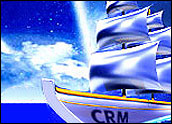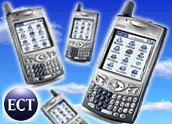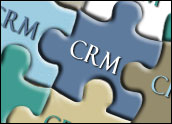
The real beauty of baking soda isn’t what it does in the oven but what it does outside of the oven. It’s flexible. It’s dynamic. It does everything it does extremely well. In addition to playing a key role in cakes, breads and pastries, it keeps refrigerators smelling fresh, can clean a bathroom or kitchen better than any chemical and can even be used as toothpaste.
In the world of technology, nothing comes closer to the breadth and versatility of baking soda than today’s customer relationship management solutions.
And, like baking soda, CRM solutions are coming out of the oven and proving their value elsewhere.
Not Just for Sales
Like all technology, CRM solutions are only as good as the data that’s put into them. And in the world of CRM, that data is serving multiple purposes for multiple people and teams. Once upon a time, CRM may have just been used for contact and sales purposes, but it’s starting to prove its versatility by branching out into more areas. Now, for example, CRM is starting to break out of its traditional role of uniting sales teams worldwide with critical contact information.
Throughout the business landscape, CRM applications are popping up everywhere from retail outlets to companies that serve primarily as distributors. The information within today’s CRM applications and solutions are automating tomorrow’s businesses processes by ensuring that everyone has access to the same data at the same time.
From a broader perspective, there are huge benefits to this consolidation of information made possible by a stealth CRM system. Take retail channels, for example. Imagine the benefit that can be realized when real-time point-of-sale systems are linked to the overall CRM solution. Real-time purchase information linked with a customer’s entire purchase and contact history allows a retailer to provide instantaneous incentives, rebates, cross selling, up selling or support.
This information is also made available to customer service, sales and marketing, allowing an organization to make proactive decisions and targeted marketing. When a CRM system makes that possible, whoever needs critical customer information — whether it’s an executive, distributor, sales associate or member of the marketing team — has it. And they have it now.
More Options, More Development
While the word “packaged” may have a bad rap in certain quarters, when it comes to CRM, it’s an asset. In the past, CRM deployments typically took 12 to 18 months — and sometimes up to 24 months — delaying the return on investment and, of course, consuming resources needlessly, requiring dedicated teams for support and maintenance.
Today, companies have several options for packaged CRM applications, which are helping businesses worldwide reduce the time it takes to develop applications aligned specifically with their core objectives. And that time savings, of course, is often translated directly into more time to develop customizations that further leverage the CRM system. Simply put, packaged applications can be customized and integrated quickly, released in highly targeted deployments and adopted rapidly by users, reducing the overall initial investment.
One of the key benefits of packaged CRM applications is flexibility. Because most of the newer packaged applications are based on a common development framework and are compliant with service-oriented architectures, it’s easy to “plug” the application into existing infrastructures and solutions and adapt them as a company’s CRM needs change and grow.
Packaged applications can be configured without having to write lines of code and they come, out-of-the-box, with the tools needed to modify the application to suit each business’s specific needs. For example, power users or IT teams can modify sales forms and publish them more quickly and with less testing. New database fields can be created just as quickly, without requiring extensive data modeling sessions or system downtime.
This flexibility shouldn’t be taken for granted; once the right CRM system is professionally implemented, long-term support and maintenance can be done in-house, saving considerable amounts of time and money. That’s because packaged applications can be reconfigured very easily because much of the capability is provided along with a framework to easily build upon and a more open architecture that allows easy and more flexible integration.
Time Saver
Another advantage: They are easily integrated with the software that most companies and organizations already use, including front end productivity tools as well as back end enterprise resource planning solutions. The integration with these other common applications means users can access, work with, and add to their CRM information through the software that’s most likely already running on their desktops, laptops, and even on their mobile devices. They don’t need to open a separate application, and they don’t need to continually move between a CRM application and their business productivity software. The back end integration through Web services means these CRM deployments can be implemented in significantly less time than is required for a traditional CRM deployments, which generally require extensive hand-coding to integrate with existing systems.
The faster time to deploy packaged CRM applications also means organizations can deploy the solution in new, more productive ways. For example, because deployment is a faster, simpler process than with custom CRM solutions, companies can more easily roll out CRM to a single department as a test, or to the department or departments that most need it. A smaller, more focused deployment can enable an organization to see return on investment more quickly, justifying broader deployment — and then that broader deployment can happen when and as the organization wishes, in a highly iterative process that allows the organization to benefit from what it learns in each deployment phase as it moves forward.
In addition, the flexibility of the packaged applications means they can be easily customized so the interface is intuitive and easier to use. Easier use means broader and faster adoption by end users. Experience has shown that adoption rates for packaged applications generally reach 90 percent within a couple of months. Because the software works through familiar desktop applications, users may not even be conscious of using a CRM program — they’re simply accessing the information they need the way they’ve always accessed data. And widespread adoption drives effectiveness, because more people are updating and using the CRM information. All of this adds up to faster time to benefit and greater return on investment for organizations.
The Future of CRM
And the future looks even brighter. Today, leading CRM vendors are working on ways to make the data that lives within CRM systems available to not only more people, but available to them in the way that they would like to use it. If you’re in the market for a CRM solution, you owe it to yourself to put any and all contenders to the test. Can the system integrate easily with other systems throughout your organization so that everyone can use it with a minimal amount of training and duplicate processes? Can the information within the system — and within others — be easily consolidated in order to move your business forward? If the answer to any of these questions is “no,” keep shopping.
John Yaggie is the North America CRM Director for Avanade, with responsibility for sales, business development and delivery of Microsoft Dynamics CRM solutions for Avanade’s enterprise customers.















































Social networking sites are a natural point of growth for CRM companies, as communities and network that are bottom-up are the perfect place to expand one’s relationships in the business world. Excellent sites are beginning to emerge, such as http://www.octopuscity.com, which offers a great free CRM and contact manager, business network, and all sorts of other free business services like a smart address book, blogs, free teleconferencing etc.